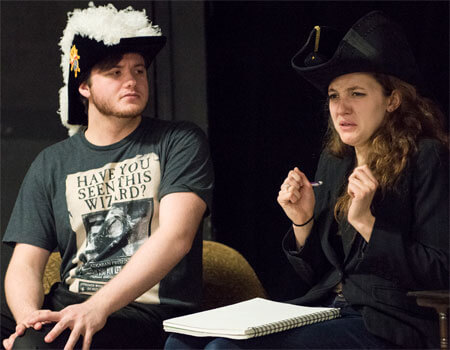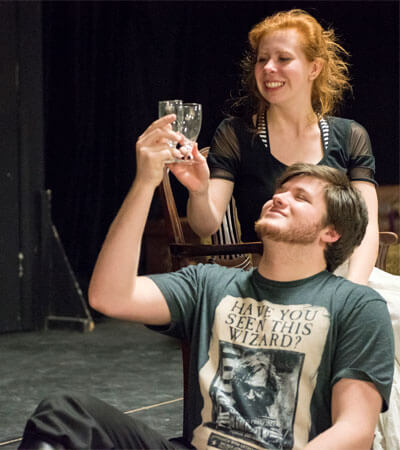Robert Schneider isn’t sure where – or if – lines are drawn between his lives as a playwright, a teacher and a human being.
The creative writing process, it seems, is always on his mind.
“It doesn’t ever really stop,” Schneider says from his home in New Haven, Conn., from where he travels most weeks to DeKalb. “It’s the sort of thing where you can be taking a shower, or making macaroni and cheese, and you suddenly think of a piece of dialogue, or something that could be better, or something you left out.”
His restless thoughts obliterate the 929-mile gap between home and work, all for the benefit of NIU School of Theatre and Dance students who either soak in his wisdom and experience or bring his storytelling-on-paper to life on stage.
Schneider, who joined the College of Visual and Performing Arts a dozen years ago, is this week enjoying the world premiere of his latest play, “Daughters of Waterloo.”
“I’m virtually unknown outside of NIU, and so NIU is my artistic home that way. The plays of mine that have been performed have been performed at NIU, with only two exceptions,” he says.
Watching actors speak his dialogue and follow his stage directions is “a very strange experience.”
“The most chilling thing is to be in the audience on opening night. It’s like you’re surrounded by people, and you’re very exposed. At the same time, you feel very isolated. It’s like you’re in a bathtub of chilled water. You can’t save the play. You can’t change it. You can’t intervene,” he says.
“If it goes well, it’s an absolute thrill,” he adds. “And if it doesn’t go well, you feel like standing up and apologizing.”
NIU colleague Stanton Davis, head of BFA Acting and director of “Daughters of Waterloo,” believes Schneider can relax and applaud with the rest of the audience.
According to the school’s marketing materials, the Studio Series production “cleverly bends time and history” leading up to the Battle of Waterloo.
“The story is told through the eyes of two contemporary women, the daughters of two key figures of the battle that determined a war, Napoleon Bonaparte, Emperor of France, and Arthur Wellesley, the Duke of Wellington,” the blurb continues. “The story’s ironic twist is that the two also share the same mother, Edith Wharton, the American author and Manhattan socialite.”
“Dr. Bob has been helpful to our actors in supplying research material; ‘Here’s what I was reading,’ or, ‘Here’s what I was thinking when I wrote this.’ He does put in his two cents,” Davis says.
“But he also thinks it’s important for the actors to have their own process. Students have emailed him. ‘What do you think the character is thinking in this moment?’ The woman playing Edith Wharton had a long conversation with him. As actors, they are fleshing out what he created.”
Students need the learning opportunities provided by debuting original works, Davis says.
Unlike classics from the pens of Shakespeare or Chekov, many unknown scrips undergo rewrites between and even during rehearsals. That can frustrate and challenge actors, he says, but simultaneously improve their skills and the ultimate success of the productions.
“Most theaters in their season do at least one new show – one new play – and a lot of theaters are devoted entirely to staging new plays,” Davis says.
“At a certain point, the playwright’s process ends and the director’s process takes over. Then the actor’s process begins. Bob is guiding the actors with words. I’m guiding them with actions. We all have to learn to let go so we can get out of the way of the actors and their process, and Bob’s been really great.”
Schneider agrees that it’s vital for actors to tackle fresh material.
“All students at some point in their undergraduate careers should work on a new play in cooperation with the playwright,” he says.
“It is a bit of a tightrope walk. There’s no guarantee with this kind of play. They’re creating the role. It’s never been produced, and it’s wide open to all kinds of possibilities,” he adds. “Plus, they’ll appreciate that plays don’t come out of books. They come out of playwrights. If they see a playwright struggling, or changing his mind, or backtracking, they’ll know that not all the struggles in theater belong to actors and directors.”
Directors also benefit from such experiences, Schneider says.
“This play is not dead and fixed yet; there’s someone you can talk to, get help from and collaborate with,” he says.
“Most directors have never worked with a living playwright. Some, I think, are scared by it. Others simply don’t know how to take advantage of the playwright. They try to fix everything by directing the actors. I’d try to do exactly the opposite. I’d take the script home and rewrite it every night.”
Calling “Daughters of Waterloo” one of his favorite plays, Schneider is pleased with what he’s seen in rehearsals – sometimes via Skype – and read in daily rehearsal reports.
“I’m delighted with the actors Stanton has chosen,” he says. “There is a pair of sisters in the play, and he has cast the roles with twins. The sisters are playing sisters! They’re discovering all kinds of sisterly interaction that comes very naturally to them, and I think that’ll serve the play well.”
Leah Harvey is one of those sisters.
Harvey and her fraternal twin, Emma, are sophomore BFA acting majors who came to NIU from Portage, Wis., where they grew up on stage together while displaying their “natural chemistry.”
“This is my first-ever lead role. This has been a really big step in my training and my skills as an artist. I have over 200 lines in this show, from one word to monologues, so that’s a new skillset for me,” Leah says.
“But I’ve approached it like any other role I’ve taken, and it’s been an interesting experience because the writing is fluid. The script changes we’ve had have given me an advantage of adaptability in my work. I can quickly react to those things.”
She understands the learning opportunity that Schneider and Davis are giving her and the rest of the cast.
“When I first read the script, my character almost seemed like that ‘Oh my gawd!’ typical teenager, but I’ve discovered so many layers since then,” says Leah, who is also a Research Rookie under Schneider’s guidance. “I also can contact Dr. Schneider and say, ‘Hey, I’ve been struggling with what you were thinking when you wrote this.’ It’s an interesting perspective for me to have because you don’t have that with Shakespeare.”
The actors also conducted research into the various periods of history depicted in the play, something Schneider expected. He’s conscientious about getting those details right, and he knows that students are as well.
“It’s a play about the generation gap. The two daughters live in the 21st century, their mother at the beginning of the 20th century and their fathers in the 19th century,” he says. “Every character brings his own technology with him or her. When they interact, there are lots of things the parents don’t understand in their children’s lives. The children have to make adjustments to deal with their parents.”
Devotion to historical accuracy went beyond facts found in textbooks, Davis says.
Actors learned period-perfect waltz steps. They learned about loading muzzle-loading firearms. They learned how to bow and curtsy.
They also learned military etiquette, such as “how to salute and about-face. We brought in a member of the student body who’s in the Air Force Reserve to teach us the proper salutes.”
“The more our kids learn how to do research into historical perspectives, the better citizens of the world they can be,” Davis says. “It should also inform their art. We do a whole semester of work on the Victorian era and the sophisticated language of the 19th century. In learning these things on stage, they’re getting a reinforcement of what they’re learning in their studio classes.”
Many of Schneider’s NIU students are also learning his personal craft. He teaches a playwriting course every spring.
“They can write anything they want, but they must bring in new pages every week. Because they’re under that obligation, I’m doing it, too,” he says. “By the end of the semester, I’ve got a pretty good start on a play, and so do they. I try to write a play every year.”
But explaining the source of that inspiration, and those concepts and words, is difficult. “Somebody once asked Arthur Miller, ‘Where do you get your ideas?’ He answered, ‘If I knew that, I’d go there more often,’ ” Schneider says with a laugh.
Writing plays “can be quite frustrating. Sometimes it doesn’t come out the way you want it to, or it doesn’t come at all. It can be a little strange to see how the thing comes together,” he says.
“I’m writing a film script right now, and I just recently came to see it as a whole. It’s there. It’s pretty much the way it’s going to be. I can improve it here and there. I can polish it. I can trim a few lines, add a few,” he adds. “But I’m very much a prisoner to the way it is – and I don’t know how it got that way. You feel cold to it. You don’t know where it came from. You don’t know why you made those choices, but there it is. That which is good is the enemy of that which is better.”








